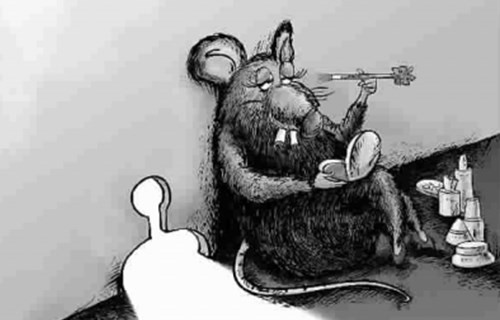导读:“硕鼠硕鼠,无食我黍!”似乎人类与老鼠之间的恩恩怨怨自古就有之。近日新西兰总理约翰·基宣布,到2050年,新西兰将成为一个无鼠国度。你怎么看?

Their abilities to travel, multiply and spread disease have always made rats one of mankind’s greatest pests.
老鼠的迁移,繁殖和传播疾病的能力已使得它成为了人类最大的敌人之一。
New Zealand says it’s time to wipe them out. Every last one of them.
新西兰表示,是时候消灭它们了。我们要一只不留。
Prime Minister John Key on Monday announced an ambitious plan to completely rid the South Pacific nation of rats and some other nuisance animals, including possums and stoats, by the year 2050.
总理约翰·基于周一宣布了这一雄心勃勃的计划,到2050年,新西兰要彻底消灭老鼠和一些其它的害虫,包括负鼠和白鼬。
The government is hoping a rat-free countryside will give a boost to native birds, including the iconic kiwi. Many bird species are threatened with extinction because rats and other pests feast on their eggs and compete with them for food.
政府希望无鼠乡村能够促进本土鸟类的繁殖,包括具有象征性的几维。由于老鼠和其它害虫嗜食这些鸟类的产卵,并与它们争夺食物,因此很多鸟类面临着灭绝的危机。
New Zealand is hoping to build on its success in eradicating rats from several of its smaller islands.
新西兰希望在一些小岛上成功灭鼠。
However, some scientists caution the goal, while laudable, will be extremely difficult to achieve in a nation that’s similar in size to the United Kingdom.
然而,一些科学家在对该计划表示赞赏的同时警告,在一个与英国国土相当的国家实现“无鼠”目标将会困难重重。
Speaking from a wildlife sanctuary in Wellington, Key said the goal would require the help of everyone from philanthropists to indigenous Maori tribes.
基在惠灵顿的一家野生动物避难所表示,该目标的实现需要每一个人的参与,从慈善家到本土毛利部落。
"This is the most ambitious conservation project attempted anywhere in the world, but we believe if we all work together as a country we can achieve it," he said.
他说:“这是世界上最具雄心的环境保护工程,但是我们相信,若我们齐心协力,我们就能够实现。”
He said the government would initially contribute 28 million New Zealand dollars ($20 million) over four years toward setting up a company to run the program, and would consider partially matching money contributed by local councils and businesses.
他表示,政府在未来四年首先会斥资2800万新西兰元(2000万美元)成立一家实施该计划的公司,并会考虑部分资金由地方议会和企业筹集。
Key acknowledged the goal would only be achieved with scientific advances.
基承认,这一目标只能通过科技进步来实现。
New Zealand’s Department of Conservation has eradicated rats from several small islands using traps, poisons and baits.
新西兰环保部通过使用鼠夹,鼠药和毒饵已经灭绝了几个小岛上的老鼠。
But it would require a massive escalation of those efforts to completely wipe out the pests.
但是要想灭绝老鼠,仍需加大努力。
Ecologist James Russell, from the University of Auckland, has written about the idea before.
奥克兰大学的生物学家詹姆斯·罗素此前就写过关于灭鼠的文章。
"I really do think it’s possible," he said. "It will require people working in every nook and corner of the country."
他说:“我真的相信这是可能实现的,但是它要求人们在国家的每一个角落下功夫。”
He said getting rid of the pests would make a huge difference to the health of native flora and fauna.
他表示,灭绝害虫能够对当地的植物群和动物群的健康做出很大改善。
New Zealand is unusual in that its native animals are mainly birds, some of which became flightless over time. When humans arrived and brought rats, the rodents had few predators.
新西兰的不同之处在于,本土动物主要是鸟类,随着时间的流逝一些鸟类已经没有飞行能力了。当人们来到这里并带来老鼠,这一啮齿动物便没有什么天敌了。
Jacqueline Beggs, another ecologist from the university, said eliminating pests from small, uninhabited islands was one thing, but getting everybody from farmers to anti-government types to agree on the idea would prove much more difficult, if not impossible.
这所大学的另外一位生物学家杰奎琳·贝格斯表示,“在无人居住的小岛上灭绝害虫是一回事,但是让每一个人——从农民到反对政府这一提议的人们——赞成这一计划可能会困难很多,即使是有可能实现。
"It’s definitely a fantastic challenge," she said. "It will really stretch the boundaries."
她说:“这绝对是一巨大挑战,它需要涉及到整个国土。”
Beggs said she also worries the goal could distract from other important environmental issues and could even create new problems.
贝格斯还表示,她还担心这一目标可能会使人们从其它重要的环境问题中分心。